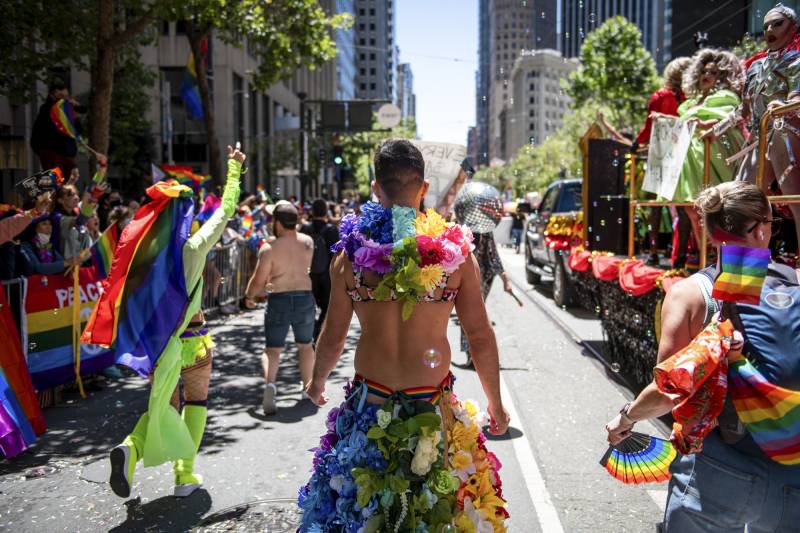While many people now experience less severe symptoms thanks to the COVID-19 vaccine and booster shots, this recent spike in cases worries many people who are immunocompromised or especially vulnerable to illness.
At the start of the COVID-19 pandemic, public health experts estimated the incubation period for COVID-19 — that is, the amount of time between exposure to COVID-19 and testing positive for the virus — was around five days. However, researchers have told KQED that as more COVID-19 variants pop up, it’s getting more complicated to estimate when exactly someone will develop COVID-19 symptoms as our bodies respond to each variant differently.
Now that a full week has passed since the Pride celebrations check in with yourself and your friends to see if anyone has felt symptoms this week. According to the CDC, this is the full list of the possible symptoms of COVID-19:
- Fever or chills
- Cough
- Shortness of breath or difficulty breathing
- Fatigue
- Muscle or body aches
- Headache
- New loss of taste or smell
- Sore throat
- Congestion or runny nose
- Nausea or vomiting
- Diarrhea
If you took an at-home COVID-19 test and tested negative even though you feel symptoms, you may want to test yourself again tomorrow. Dr. Peter Chin-Hong, an infectious disease expert at UCSF, told KQED earlier this year that when you experience symptoms, which means your body’s immune system is working to get rid of COVID-19. For a lot of people who have already been infected in the past, their immune system is getting better at forming an immune response to COVID-19, even when the amount of virus in our body is low.
When your body detects a burgeoning coronavirus infection now, Chin-Hong told KQED, “your whole immune system just gets agitated and active, and you begin to get sick sooner, but you actually don’t have as much virus in your blood yet.” However, there needs to be a specific amount of coronavirus in your body for an at-home COVID-19 test to show up positive (even if the virus is already in your system).
Talk about sexual health
If you met someone new during Pride weekend and were sexually active with them, public health officials recommend that you take some time to check in with yourself about any potential risks from that encounter. A few questions to ask yourself:
- Did you get screened for STIs beforehand? Do you know if they did?
- Did you talk with them about safe sex practices beforehand?
- Did you use a condom?
- Did you — or your partner — take HIV pre-exposure prophylaxis (HIV PrEP)?
If you are unsure about some of these questions, that is okay. What matters now is checking in with your healthcare provider and letting them know that you had a new sexual partner and want to take some extra steps to know if you were potentially exposed to any STIs.
Public health experts point out that there are now multiple ways to prevent an STI — even after a potential exposure. Doxycycline post-exposure prophylaxis (or DoxyPEP), an antibiotic taken after sex, can help prevent infections like chlamydia and syphilis. “We’ve shown through research that that strategy is very effective at preventing bacterial STIs,” said Dr. Stephanie Cohen, director of HIV and STI prevention at the San Francisco Department of Public Health (SFDPH).
In 2022, cases of mpox (formerly known as monkeypox) increased following SF Pride. And while officials have not yet detected a similar outbreak, it’s important to remember that getting a first shot of the monkeypox vaccine after exposure to the virus can help prevent the disease from developing and reduce symptoms if it does develop. Timing here is critical, and you can get a free mpox vaccine in San Francisco — you don’t need health insurance to get this important protection.
Looking for an HIV test but don’t have health insurance? Several cities in the Bay Area participate in TakeMeHome, a program created by several public health groups, including the Rollins School of Public Health at Emory University. TakeMeHome sends eligible participants a free at-home HIV test that they can later mail in to get their results. Check if you qualify.
Keep seeking out community
Pride is so much more than what happens in downtown San Francisco on the last weekend of June.
“Pride is really all year-round for us,” said Miguel Raphael Bagsit, associate director of communications at the SF LGBT Center, which, in partnership with other groups, organized a very thorough line-up of community events during June.
